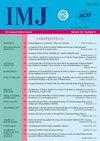CONCOMITANT IMMUNE THERAPY IN ONCOLOGY PRACTICE
Q4 Medicine
引用次数: 0
Abstract
Radiation and polychemotherapy significantly affect the immune system of a cancer patient, unabling to adequately respond to infectious agents and provide effective antitumor protection. Rehabilitation of immune disorders is an urgent task, the solution of which will contribute to the generalization of experience when suing the immune modulators in cancer patients. To summarize the existing data on the use of concomitant immune therapy in antitumor treatment, the reports published within 30 years in Pubmed, Cochrane Library, ScienceDirect and the Vernadsky National Library of Ukraine were analyzed. It is expedient to use immune correction at different stages of antitumor treatment in the case of compliance with certain criteria for the prescribing the immune modulatory drugs. Their use is most justified after the primary tumor removal, even in the presence of metastases, because the increase in antitumor resistance is achieved in the absence of tumor cells in the patient's body or their presence in minimal quantities. Possibilities and goals of concomitant immune therapy in cancer patients should be considered taking into account the stage of treatment. Immune modulators with additional properties (detoxification, antioxidant) can serve as universal drugs. In the early post−surgery period, it is advisable to use the drugs, affecting the cells of the mononuclear phagocyte system for the prevention of postoperative infectious complications. During radiation and chemotherapy, preference should be given to the drugs with antitoxic effects and capable of preventing the leukopenia development. Thus, the prescribing of concomitant immune therapy in the combined treatment of cancer patients is an important task, demanding a balanced approach. Key words: immune therapy, immune modulators, quality of life, cancer patients.肿瘤学实践中的联合免疫治疗
辐射和多氯疗法显著影响癌症患者的免疫系统,无法充分应对传染源并提供有效的抗肿瘤保护。免疫障碍的康复是一项紧迫的任务,其解决将有助于在起诉癌症患者的免疫调节剂时总结经验。为了总结联合免疫治疗在抗肿瘤治疗中的现有数据,分析了30年内发表在Pubmed、Cochrane Library、ScienceDirect和乌克兰Vernadsky国家图书馆的报告。在符合某些免疫调节药物处方标准的情况下,在抗肿瘤治疗的不同阶段使用免疫校正是有利的。它们的使用在原发性肿瘤切除后是最合理的,即使在存在转移的情况下也是如此,因为抗肿瘤耐药性的增加是在患者体内没有肿瘤细胞或肿瘤细胞数量很少的情况下实现的。癌症患者联合免疫治疗的可能性和目标应考虑到治疗阶段。具有额外特性(解毒、抗氧化)的免疫调节剂可以作为通用药物。在术后早期,建议使用药物,影响单核吞噬细胞系统,以预防术后感染并发症。在放疗和化疗期间,应优先选择具有抗毒作用并能预防白细胞减少症发展的药物。因此,在癌症患者的联合治疗中,联合免疫治疗的处方是一项重要的任务,需要一种平衡的方法。关键词:免疫疗法,免疫调节剂,生活质量,癌症患者。
本文章由计算机程序翻译,如有差异,请以英文原文为准。
求助全文
约1分钟内获得全文
求助全文
来源期刊

International Medical Journal
医学-医学:内科
自引率
0.00%
发文量
21
审稿时长
4-8 weeks
期刊介绍:
The International Medical Journal is intended to provide a multidisciplinary forum for the exchange of ideas and information among professionals concerned with medicine and related disciplines in the world. It is recognized that many other disciplines have an important contribution to make in furthering knowledge of the physical life and mental life and the Editors welcome relevant contributions from them.
The Editors and Publishers wish to encourage a dialogue among the experts from different countries whose diverse cultures afford interesting and challenging alternatives to existing theories and practices. Priority will therefore be given to articles which are oriented to an international perspective. The journal will publish reviews of high quality on contemporary issues, significant clinical studies, and conceptual contributions, as well as serve in the rapid dissemination of important and relevant research findings.
The International Medical Journal (IMJ) was first established in 1994.
 求助内容:
求助内容: 应助结果提醒方式:
应助结果提醒方式:


